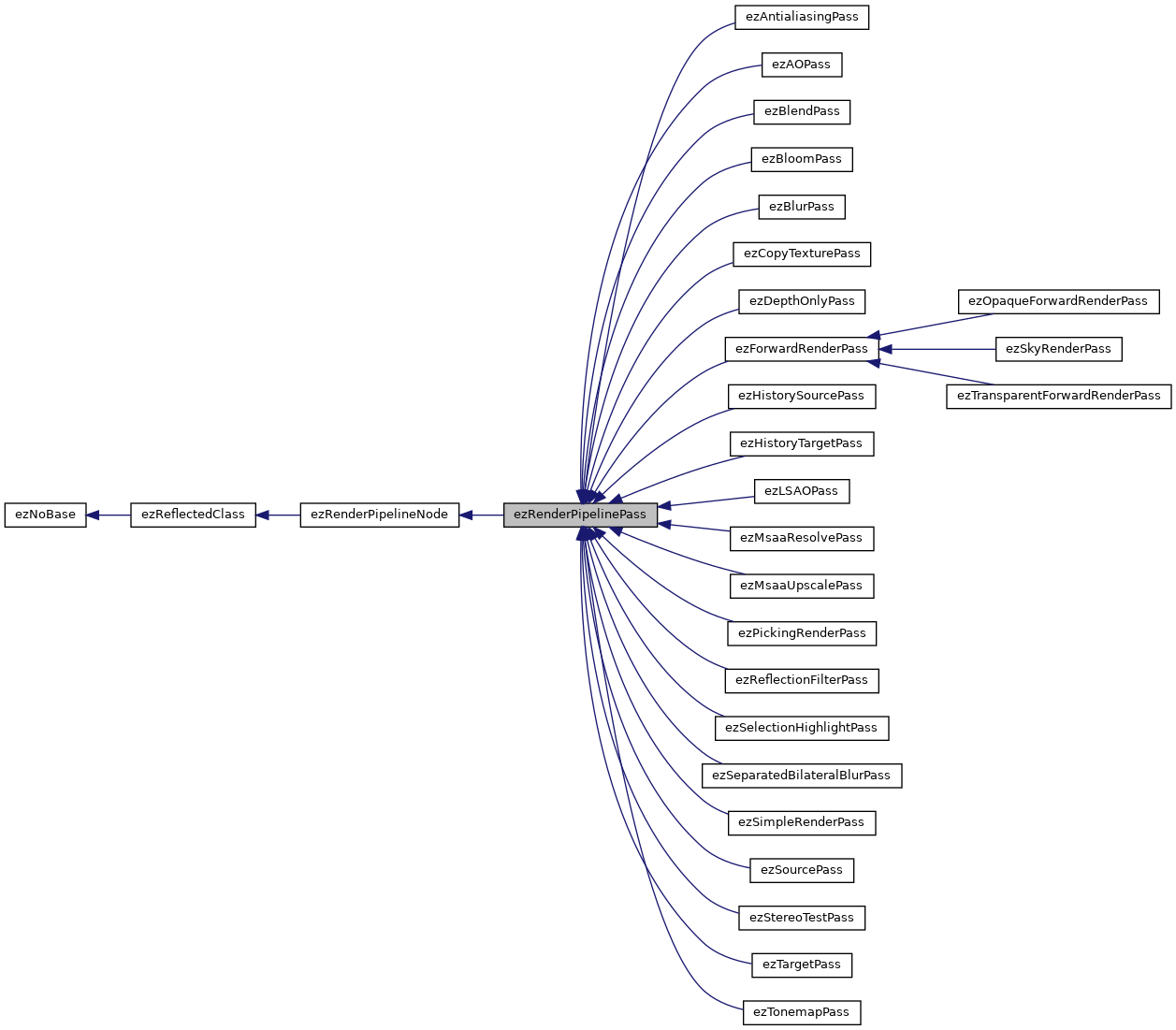|
|
| ezRenderPipelinePass (const char *szName, bool bIsStereoAware=false) |
| |
|
void | SetName (const char *szName) |
| | Sets the name of the pass.
|
| |
|
const char * | GetName () const |
| | returns the name of the pass.
|
| |
|
bool | IsStereoAware () const |
| | True if the render pipeline pass can handle stereo cameras correctly.
|
| |
| virtual bool | GetRenderTargetDescriptions (const ezView &view, const ezArrayPtr< ezGALTextureCreationDescription *const > inputs, ezArrayPtr< ezGALTextureCreationDescription > outputs)=0 |
| | For a given input pin configuration, provide the output configuration of this node. Outputs is already resized to the number of output pins.
|
| |
| virtual ezGALTextureHandle | QueryTextureProvider (const ezRenderPipelineNodePin *pPin, const ezGALTextureCreationDescription &desc) |
| |
| virtual void | InitRenderPipelinePass (const ezArrayPtr< ezRenderPipelinePassConnection *const > inputs, const ezArrayPtr< ezRenderPipelinePassConnection *const > outputs) |
| | After GetRenderTargetDescriptions was called successfully for each pass, this function is called with the inputs and outputs for review. Disconnected pins have a nullptr value in the passed in arrays. This is the time to create additional resources that are not covered by the pins automatically, e.g. a picking texture or eye adaptation buffer.
|
| |
| virtual void | Execute (const ezRenderViewContext &renderViewContext, const ezArrayPtr< ezRenderPipelinePassConnection *const > inputs, const ezArrayPtr< ezRenderPipelinePassConnection *const > outputs)=0 |
| | Render into outputs. Both inputs and outputs are passed in with actual texture handles. Disconnected pins have a nullptr value in the passed in arrays. You can now create views and render target setups on the fly and fill the output targets with data.
|
| |
|
virtual void | ExecuteInactive (const ezRenderViewContext &renderViewContext, const ezArrayPtr< ezRenderPipelinePassConnection *const > inputs, const ezArrayPtr< ezRenderPipelinePassConnection *const > outputs) |
| |
| virtual void | ReadBackProperties (ezView *pView) |
| | Allows for the pass to write data back using ezView::SetRenderPassReadBackProperty. E.g. picking results etc.
|
| |
|
virtual ezResult | Serialize (ezStreamWriter &inout_stream) const |
| |
|
virtual ezResult | Deserialize (ezStreamReader &inout_stream) |
| |
|
void | RenderDataWithCategory (const ezRenderViewContext &renderViewContext, ezRenderData::Category category) |
| |
|
EZ_ALWAYS_INLINE ezRenderPipeline * | GetPipeline () |
| |
|
EZ_ALWAYS_INLINE const ezRenderPipeline * | GetPipeline () const |
| |
|
void | InitializePins () |
| |
|
ezHashedString | GetPinName (const ezRenderPipelineNodePin *pPin) const |
| |
|
const ezRenderPipelineNodePin * | GetPinByName (const char *szName) const |
| |
|
const ezRenderPipelineNodePin * | GetPinByName (ezHashedString sName) const |
| |
|
const ezArrayPtr< const ezRenderPipelineNodePin *const > | GetInputPins () const |
| |
|
const ezArrayPtr< const ezRenderPipelineNodePin *const > | GetOutputPins () const |
| |
|
virtual const ezRTTI * | GetDynamicRTTI () const |
| |
|
bool | IsInstanceOf (const ezRTTI *pType) const |
| | Returns whether the type of this instance is of the given type or derived from it.
|
| |
|
template<typename T > |
| EZ_ALWAYS_INLINE bool | IsInstanceOf () const |
| | Returns whether the type of this instance is of the given type or derived from it.
|
| |
Render into outputs. Both inputs and outputs are passed in with actual texture handles. Disconnected pins have a nullptr value in the passed in arrays. You can now create views and render target setups on the fly and fill the output targets with data.
Implemented in ezPickingRenderPass, ezAntialiasingPass, ezAOPass, ezBlendPass, ezBloomPass, ezBlurPass, ezCopyTexturePass, ezDepthOnlyPass, ezForwardRenderPass, ezHistorySourcePass, ezHistoryTargetPass, ezLSAOPass, ezMsaaResolvePass, ezMsaaUpscalePass, ezReflectionFilterPass, ezSelectionHighlightPass, ezSeparatedBilateralBlurPass, ezSimpleRenderPass, ezSourcePass, ezStereoTestPass, ezTargetPass, ezTonemapPass, and ezTransparentForwardRenderPass.



 Public Member Functions inherited from ezRenderPipelineNode
Public Member Functions inherited from ezRenderPipelineNode Public Member Functions inherited from ezReflectedClass
Public Member Functions inherited from ezReflectedClass Static Public Member Functions inherited from ezNoBase
Static Public Member Functions inherited from ezNoBase